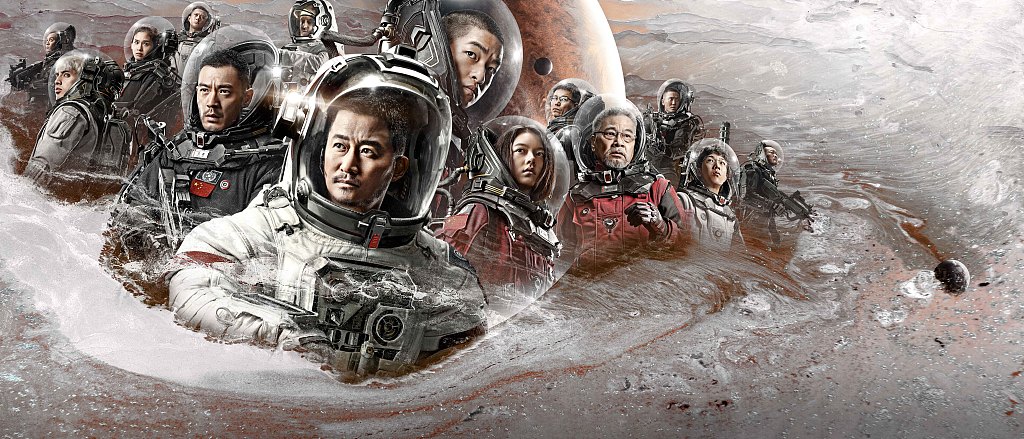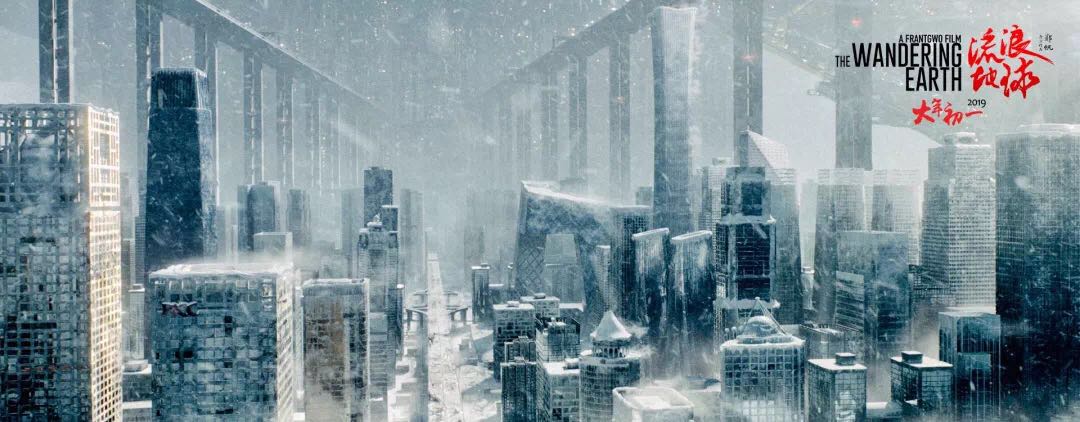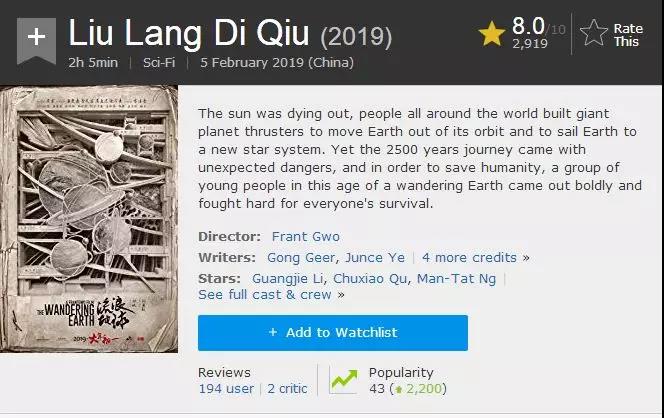Chinese science fiction movie The Wandering Earth had a slow start at the box office, but quickly gained momentum, creating both domestic and international buzz.

(Photos: VCG)
On the first day of its release, at the start of the Spring Festival holiday, it debuted only in fourth place among eight flicks on the big screen in China.
It has risen every day and quickly gained momentum with its eye-catching special effects, decent reviews and solid buzz. It earned a stunning 2 billion yuan ($295 million) in six days, making itself the highest-grossing film released over this holiday season.
The Wandering Earth was also released in the US, Canada, Australia and New Zealand. It has a high attendance rate in these places. Cinemas have correspondingly increased the number of screens showing the film. Many foreign media have noticed this outer-space spectacle's impact and given it laudatory reviews.

A New York Times article deems The Wandering Earth to be the dawning of a new era in China's film industry. "China was a latecomer to space exploration, and in the movies, it has been a latecomer to science fiction, too. That is about to change," according to the article. It connects the movie with China's Chang'e-4 probe, saying, "The openings also come as China reached a milestone in space: the landing of a probe on the far side of the moon in January," commending both China's sci-fi movie and space exploration program.
Forbes' film critic defines The Wandering Earth as China's first big-budget sci-fi blockbuster, saying, “It is merely the first genuinely successful, big-budget sci-fi outer-space fantasy from China. As a spectacle, it's a knockout." The critic believes the film provides a sort of straight-faced hybrid of Armageddon, The Core, Gravity and Interstellar, noting that the film tried very much to approximate the stereotypical Hollywood blockbusters while managing to maintain its own traits. He also says that if China can make movies like this, the need for Hollywood imports would be much less. "As Chinese productions get bigger, the mere notion of a Hollywood blockbuster… will be significantly less special," the article writes.

(Screenshot from theguardian.com)
An article from The Guardian notes that The Wandering Earth marks China's entrance into the cinematic space race, and challenges Hollywood with China's own sci-fi blockbuster. The writer says that China's film market is expected to supersede the US as the world's largest by 2022.
America's The Verge speaks highly of The Wandering Earth, saying the film makes itself memorable by its level of attention to detail and outright beauty, while its grandiose spectacle also stands out. The reviewer says the film is a telling illustration of the similarities and differences between Chinese and American values. The reviewer points out that the importance of family connections and the nobility of sacrifice are familiar to American audiences, but the film also places a strong focus on global collective action, on the need for international cooperation, and for the will of the group to triumph over the will of the individual. The reviewer is pretty optimistic about China's film development. "It'll continue to be fascinating to see how the country brings its own distinctive voices and talents into a global market," the reviewer concludes.
It is noteworthy that some media critics partly attribute the film's success to Liu Cixin, the first Chinese winner of Hugo Award for science fiction. His short story was adapted into The Wandering Earth.

(Screenshot from IMDb)
The Wandering Earth scored eight on IMDb (the US renowned online movie database), and it's been hotly discussed on overseas social media and film community websites.
"Chinese blockbuster The Wandering Earth might be the best sci-fi movie of 2019," critic Travis Johnson writes on the Australian website Flicks. He deems that this movie could be a game-changer.
Dave Taylor, a film critic also a sci-fi geek, posts a long and detailed review on US sci-fi website ScienceFiction.com. The review has had an impact, and even been translated completely into Chinese by Wenhui Daily. "The visual effects are stunning and rival the best of Hollywood's sci-fi epics," writes Taylor. Yet he pinpoints some defects and also some theoretical loopholes that the story ignores. For example, in the film, the Earth still had an atmosphere once it stops spinning. Even so, he still recommends audiences to watch The Wandering Earth. He writes, "I say go see it and enjoy a wholly different science fiction epic that marks a milestone in Chinese cinema."
There is criticism from foreign audiences, too. Some pointed out misspellings and several grammatical mistakes in the subtitles. Some say that there wasn't a single character that could be related to, while others think the acting is weak and character motivations are vague.

More Chinese own sci-fi movies are due to debut in 2019, including Shanghai Fortress, about an alien attack on Earth, and Pathfinder, about a spaceship that crashes on a desert planet. As the director of The Wandering Earth Guo Fan (Frant Gwo in English) says, 2019 could be remembered as first year of Chinese sci-fi films' new era, for it is not just about one successful movie but about the emergence of multiple films in the same genre.
There is still a long way for Chinese sci-fi films to go. If China's filmmaking aims to appeal to global audiences, Chinese own culture and distinctive voices would offer a strong appeal. The Wandering Earth ends with the line, "Regardless of the outcome for the history of mankind, we have decided to choose hope." It is also true that, regardless of the outcome of the development of China's sci-fi film industry, we choose to hope.


